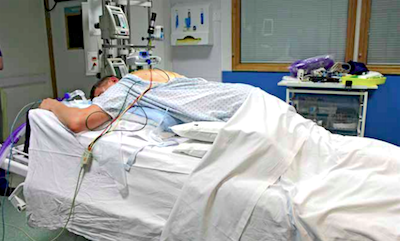For COVID-19 Patients, Breathing Easier Could Be as Simple as Flipping Over.

One in four patients who arrive at Boston Medical Center with COVID-19 go into the intensive care unit, says Nicholas Bosch, a pulmonary and critical care fellow at BMC and a master of science in epidemiology student at the School of Public Health.
But there may be a way to keep more patients from needing the ICU’s limited space and ventilators. “It’s as simple as flipping on your stomach,” Bosch says.
Bosch is leading a randomized controlled trial at BMC to see if having COVID-19 patients start lying prone (that is, on their stomachs) soon after arriving at the hospital can help keep their symptoms from getting worse. The trial will begin as soon as possible, pending final regulatory approval.
The study team includes over 50 students, faculty, staff, doctors, nurses, and department heads from BMC and the Schools of Medicine and Public Health. “From top to bottom, there’s been huge interest and so many volunteers, and I don’t think the study would work without that,” Bosch says. “There would be no time, without that.”
Years before the new coronavirus emerged, research showed that prone positioning reduced deaths among patients with acute respiratory distress syndrome—the condition that is now often the cause of death in COVID-19 patients.
The idea, Bosch explains, is that the part of the lungs that is best at pulling oxygen into the blood is along a person’s back. When a patient lies on their back, that part of the lungs gets too much blood and not enough oxygen. Prone positioning gives that back part of the lungs a better ratio. “It’s just gravity,” Bosch says.
In the current pandemic, many hospitals are now “proning” patients who already have severe COVID-19, including those on ventilators, and it seems to be helping.
“So much of what clinicians are doing with COVID right now is investigational, experimental,” Bosch says—but without investigating and experimenting in scientifically rigorous ways. As a cheap, easy initiative, proning seems worth studying properly.
However, running a trial in a hospital right now is a major challenge, especially because there isn’t enough personal protective equipment (PPE) to spare for researchers.
That’s where Craig Ross, research assistant professor of epidemiology, comes in. He created a smartphone-based system to gather data directly from patients remotely. The system includes directions with pictures for patients to flip onto their stomach (careful not to pull out all the wires and tubes they’re routinely connected to), and reminds them to do it three times a day for an hour and at night.
“A couple times a day, Craig is also pinging them to say, ‘Will you fill out this survey?’” Bosch says. These surveys ask patients whether they are proning, for how long, and whether they are having any issues.
COVID-19 research also needs to move quickly, so that clinicians can start using effective strategies as soon as possible. To help with this aspect, Gheorghe Doros, professor of biostatistics, is providing expertise in Bayesian adaptive study design for the trial. Adaptive study uses the data gathered in an ongoing trial to change certain aspects of the trial in predetermined ways, instead of needing a series of studies to test new possibilities and zero in on strong results.
It can also be more ethical, he says: “In this study, if we learn from accumulating data that there is some indication that one treatment is better than the other, we’re going to assign more patients to that particular treatment. And, if the indication is overwhelming towards one of the treatments, we can stop the trial and say, ‘We have the answer,’ rather than waiting until the end.”
Bosch, for his part, is new to randomized controlled trials, and says it is an incredible learning experience. He has spent the last three years as a research fellow at BMC with Allan Walkey, associate professor of pulmonary, allergy, sleep & critical care medicine at MED and of health law, policy & management at SPH. (Walkey is also the faculty principal investigator for this trial.) Bosch says he decided to pursue an MS in epidemiology at SPH to become a better physician-investigator working in the ICU.
Of course, being a student, researcher, and physician all at the same time during this pandemic is difficult, Bosch says. “It’s hard to focus just on research and classes when you know that there are patients who are sick.” But treating patients also helps him feel more grounded in all of his work, and feel better about how these different roles come together, he says. “And all of my professors have been quite kind about allowing me to turn in things whenever I have the chance, which I couldn’t appreciate more,” he says.
“Nick exemplifies the best qualities of students in our program,” Ross says of Bosch. “SPH students are working very hard, using scientific rigor to do really creative projects, and showing extraordinary leadership. This has been an amazing thing he’s pulled together so quickly.”